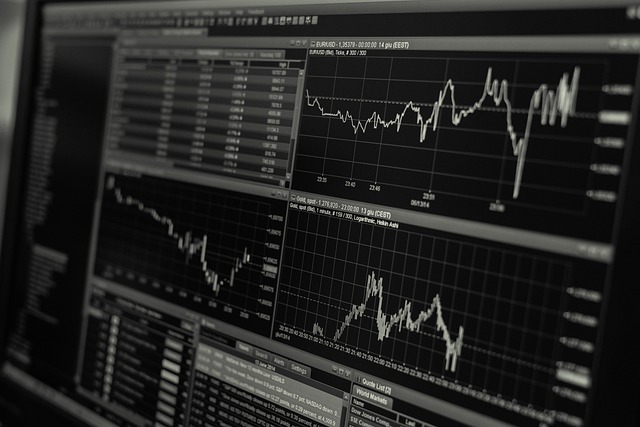Is Trading Halal or Haram in 2025? An In-Depth Analysis
Author: Jameson Richman Expert
Published On: 2025-08-08
Prepared by Jameson Richman and our team of experts with over a decade of experience in cryptocurrency and digital asset analysis. Learn more about us.
As the global financial landscape continues its rapid evolution into 2025, Muslim traders and investors face increasingly complex ethical and legal questions regarding the permissibility of various trading activities within the framework of Shariah law. This debate encompasses a broad spectrum of instruments—from traditional stocks and commodities to cutting-edge digital assets like cryptocurrencies, tokens, and DeFi platforms. The proliferation of online trading platforms, algorithmic and high-frequency trading, and innovative derivatives further complicate discerning whether such activities align with Islamic ethical principles. Making ethically sound and Shariah-compliant decisions requires a nuanced understanding of the foundational principles of Islamic finance and their application to modern, often complex, trading environments. This knowledge is vital to avoid inadvertent violations and to ensure that financial pursuits adhere to Islamic teachings while also enabling market participation.

Foundations of Islamic Finance and Their Application to Modern Trading
Islamic finance is rooted in the core texts of the Quran and Hadith, complemented by the broader Islamic legal system (Fiqh). Its primary aims are to promote justice, social responsibility, and equitable economic participation. When assessing whether a trading activity is permissible (halal), scholars consider several key prohibitions and principles, including:
- Riba (Interest): Any earnings derived from interest, whether through conventional loans, interest-bearing securities, or similar mechanisms, are strictly forbidden. This prohibition emphasizes justice and prohibits exploitative gains, viewing them as unjust enrichment.
- Gharar (Excessive Uncertainty): Transactions involving high ambiguity, unpredictability, or lack of clarity are prohibited. This principle aims to prevent unjust enrichment, market manipulation, and situations akin to gambling, thereby fostering transparency and certainty in financial dealings.
- Maysir (Gambling): Activities that involve excessive risk, chance, or speculative behavior—akin to gambling—are haram. Such activities prioritize quick, often speculative profits over productive enterprise, social welfare, and risk-sharing.
- Haram Assets and Industries: Trading in forbidden items (such as alcohol, pork, or illicit drugs), or sectors involved in unlawful activities (weapons for illegal purposes, adult content, gambling, etc.), is impermissible. Ensuring assets are compliant involves rigorous screening and due diligence.
Applying these principles to trading requires a comprehensive assessment of the underlying assets, the methods employed, and the intent behind transactions. For example, investing in stocks of companies involved in haram industries is prohibited, while trading in assets aligned with Islamic ethics—such as halal stocks, commodities, or ethically used digital assets—can be permissible if the activity promotes genuine economic activity and avoids excessive speculation. Moreover, the nature of the trading activity—whether it involves leverage, derivatives, or derivatives-based products—must also be examined through the lens of these core principles.
Cryptocurrency Trading in 2025: Is It Halal or Haram?
The permissibility of cryptocurrencies in 2025 remains one of the most debated topics among Islamic scholars and financial practitioners. After years of evolving viewpoints, many now recognize the potential for cryptocurrencies to be consistent with Islamic principles under specific conditions. The key factors influencing their halal or haram status include:
- Decentralization and Riba-Free Nature: Many cryptocurrencies operate on decentralized blockchain technology, which inherently lacks interest-based mechanisms. Their independence from central banks and interest-based monetary systems aligns with the Islamic prohibition of riba. This decentralization reduces the likelihood of exploitative interest accruals inherent in traditional finance.
- Market Behavior and Speculation: Excessive volatility, leverage, and manipulative practices—such as pump-and-dump schemes—resemble gambling (maysir) and involve gharar. When trading becomes highly speculative, with quick profit motives and no real backing or utility, scholars tend to classify such activities as haram.
- Use Cases, Transparency, and Provenance: Cryptocurrencies used for legitimate, transparent transactions—verified via blockchain—are more likely to be deemed halal. Conversely, tokens involved in illegal activities like money laundering, terrorism financing, or fraud are unequivocally haram due to their unlawful nature and lack of transparency.
- Underlying Assets and Industry Involvement: Cryptos linked to haram sectors (e.g., gambling platforms, adult content, or illicit substances) are not permissible. Ensuring compliance involves scrutinizing the token’s purpose, the project’s transparency, and adherence to ethical standards.
Many Islamic scholars and institutions recommend a cautious approach, emphasizing the importance of risk management, ethical use, and adherence to the principles of Islamic finance. For instance, trading in spot markets without leverage, avoiding transactions involving haram industries, and steering clear of manipulative practices are generally advised. Organizations like AAOIFI are actively developing detailed fatwas, guidelines, and standards to clarify the permissibility of various crypto assets. Such efforts aim to provide clarity, promote responsible trading, and facilitate broader acceptance of digital assets within Islamic finance.
Practitioners should consult qualified fatwas from reputable scholars, stay updated on emerging rulings, and critically evaluate the sources and uses of cryptocurrencies. Resources such as how Binance trading works and how to trade on Bybit provide procedural insights. Nonetheless, ethical considerations—such as avoiding haram sectors and speculative excess—must be central to all trading decisions to ensure compliance with Islamic law.
Assessing Online Trading Platforms: Legitimacy and Shariah Compliance
The choice of trading platforms significantly influences a trader’s ability to remain compliant with Shariah principles. Reputable platforms—like Binance, MEXC, BitGet, and Bybit—have developed advanced security features, transparent fee structures, and in some cases, offer Islamic (Swap-Free) accounts explicitly designed to align with Shariah standards. When evaluating a platform’s compliance, consider the following criteria:
- Regulatory Oversight: Is the platform regulated by recognized authorities such as the FCA (UK), CySEC (Cyprus), or other reputable regulators? Proper regulation provides an additional layer of accountability and reduces the risk of fraud or unethical practices.
- Shariah-Compliant Features: Does the platform offer Islamic or Swap-Free accounts? Are there clear procedures to avoid interest charges, rollover fees, or other interest-based mechanisms? How do they ensure that trading activities remain within the bounds of Shariah?
- Transparency and Data Security: Are transaction processes secured with high-grade encryption? Is fee disclosure clear, predictable, and free from hidden charges? Transparency in operations and data handling fosters trust and compliance.
Additionally, consulting with Islamic finance scholars or advisory bodies can further validate whether a platform’s features align with Shariah principles. Resources like trusted trading platform reviews provide insights into their compliance, security standards, and reputation. Remember, aligning your trading activities with Shariah law involves due diligence beyond just platform features—personal knowledge, ongoing education, and scholarly guidance are essential.

Leverage, Speculation, and Their Ethical Implications in Islamic Finance
Leverage amplifies potential gains but also magnifies risks, and its use must be carefully scrutinized in Islamic finance. Excessive leverage is generally discouraged because it can resemble gambling (maysir) and lead to unjust enrichment or exploitation of less-informed traders. The core concern is whether leverage is employed responsibly within a risk-sharing framework that aligns with the principles of justice and fairness. Responsible use involves limiting leverage ratios to levels that do not cause undue risk or potential harm to traders.
Similarly, highly speculative strategies—focused solely on short-term price movements and often involving derivatives—may violate ethical standards due to gharar and maysir. Such activities prioritize quick profits over real economic activity and can destabilize markets. Instead, a conservative and value-driven approach, emphasizing long-term sustainability, risk mitigation, and real asset backing, aligns better with Islamic ethics. For example, integrating fundamental analysis, market trend insights, and prudent risk management tools—such as monitoring Ethereum (ETH) market trends via ETH market insights—can promote responsible trading that respects Islamic principles.
Practical Guidelines for Ensuring Shariah Compliance in Trading Activities
Muslim traders seeking to remain compliant with Islamic law should adopt strategic practices, including:
- Consult Qualified Islamic Scholars: Regularly seek personalized fatwas and guidance on specific assets, trading methods, and financial instruments from qualified Muftis or Islamic finance experts. Documented advice ensures clarity and reduces inadvertent violations.
- Utilize Islamic or Swap-Free Accounts: Many reputable platforms now offer accounts designed to eliminate interest charges, rollover fees, or other interest-based mechanisms—thus aligning trading activities with Shariah standards.
- Screen Assets Diligently: Employ rigorous due diligence to exclude assets involved in haram sectors or activities. Employ screening tools, Islamic finance screening criteria, and scholarly opinions to assess the permissibility of each asset.
- Control Leverage and Risks Prudently: Use conservative leverage levels, focus on sustainable growth, and avoid speculative trades lacking ethical justification. Incorporate risk management techniques aligned with Islamic risk-sharing principles.
- Stay Educated and Informed: Continuously update your knowledge through Islamic finance publications, scholarly fatwas, and market analyses to ensure ongoing compliance and awareness of evolving rulings.
For example, carefully considering whether to hold or divest assets like XRP—based on market trends, ethical considerations, and scholarly guidance—can help maintain profitability while complying with Islamic principles, as discussed in Should I sell my XRP now or wait.
Conclusion: Navigating 2025’s Modern Markets with Faith and Integrity
In summary, determining whether trading is halal or haram in 2025 depends on a confluence of factors—asset types, trading methodologies, leverage use, and the adherence to Islamic ethical standards. The rapid advent of digital assets, sophisticated trading strategies, and online platforms offers both opportunities and challenges for Muslim traders. To participate responsibly, traders must prioritize consulting qualified scholars, selecting Shariah-compliant trading platforms, and adopting ethical trading strategies rooted in Islamic principles.
Developing a comprehensive understanding of core Islamic finance tenets, staying informed through scholarly fatwas and reputable sources, and practicing prudent risk management are essential for navigating contemporary markets while fulfilling religious obligations. Regular review of updated fatwas and guidelines from trusted authorities such as trusted trading platforms is recommended. For practical insights into platform operation, explore how Binance trading works and how to trade on Bybit. Applying these principles ensures that Muslim traders can confidently participate in modern markets while upholding their faith and ethical standards.